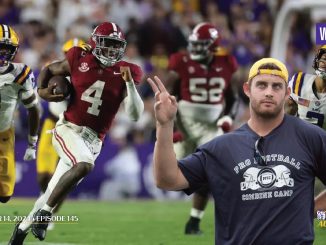
The LSU Athletic Department deals with bottom lines much differently than most fans who cheer for the Ole War Skule in a state with the nation’s second highest poverty rate. With economic studies indicating that two out of five people in America cannot immediately pay a $400 obligation, the LSU sports machine is running through millions in cash faster than Jayden Daniels raced through Florida defenders this year.
There is no real budget for the LSU athletic ship. The department spends and spends and runs multi-million-dollar deficits expecting a rich uncle to bail it out. Without the contributions of the Tiger Athletic Foundation, a substantial haircut would be in store for an operation which hemorrhages red ink, producing a $34.8 million deficit at the close of the fiscal year on June 30. Scott Woodward can thank Uncle TAF for his salvation.
TAF is the benevolent rich relative for every component of the LSU athletic apparatus other than football. Financial reports released by the university indicate football was nearly $6 million in the black while all other sports drained from Brian Kelly’s wealthy pool.
The biggest offender in deficit spending was women’s basketball at a loss of $7.7 million followed by men’s basketball at $6.6 million. These numbers reveal that national championships on the women’s court siphon funds from the football flagship, and men’s basketball may be a lost cause from a profit-loss perspective.
When Dale Brown was roaring in his salad days, his program made money for LSU while the women’s program absorbed much milder deficits. For this reason alone, Brown should have a statue erected outside the PMAC. He won big and did not feast off football to do it. Kim Mulkey will run an even larger deficit this year because she is now receiving annual compensation in the $4 million range. Mulkey should congratulate Coach Kelly. His unit paid for her NCAA trophy.
Men’s baseball, which celebrated a national championship in Omaha, posted a $2.2 million loss. This deficit spending is dangerous for a school with a puny $625 million endowment. By comparison, the University of Texas swaggers into the SEC with a $32 billion endowment.
If UT wants to buy championships, its massive endowment provides a nuclear option. In the play for pay NIL world, LSU has an embarrassingly low number of graduates who become donors. This is a huge obstacle in competition with its conference rivals from the Lone Star State. Texas A&M boasts an endowment of $18 billion.
Tiger Rag is continuing its tradition of publishing the annual breakdown of yearly salaries for athletic department officials. This database does not include additional compensation from TAF, which operates as a private entity. Athletic Director Scott Woodward earns $7 million per year according to testimony from Associate Athletic Director Verge Ausberry, who spoke of financial matters on the stand at the Sharon Lewis federal trial.
Despite Woodward’s apparent ranking as the second highest paid state official in Louisiana, the LSU database does not list him as being compensated by the LSU athletic department. Uncle TAF is generous indeed.
Wherever the money is derived, there is something terribly wrong with an athletic official receiving ten times the amount of compensation as the LSU president and the governor of Louisiana reaping less than two percent of the annual largesse for the LSU A.D.
Governor Jeff Landry will soon control the destiny of LSU. Whatever the governor wants in higher education, he eventually gets it. LSU President Bill Tate is a Paper Tiger. Gov. Landry has authority to make sweeping changes, and he indicates he will wield the levers of power to accomplish his vision for the state.
LSU received much less in state funding this fiscal year than did the University of Louisiana system. With Covid funds drying up, an era of fiscal austerity may be taking hold. LSU withstood 13 budget cuts during the Jindal years with President King Alexander doing his best under dire circumstances.
President Tate should answer questions about profligate spending in his athletic department. To his credit, the LSU president is not a free spender. Tate directs the entire university with just two people in his communications department. The LSU athletic department employs a small army of well-compensated public relations specialists and a brand officer, who earns more than the governor.
When this writer was a student, LSU operated a sports information department with three full-timers in Paul Manasseh, Larry White and Snookie Newman. And there were more sports to publicize.
The vitality and stability of Louisiana’s flagship university is more essential than games people play. The athletic department is riding the success of one program, which is largely based on what occurs seven nights a year at Tiger Stadium.
Former LSU Chancellor Mike Martin noted his athletic department was the front porch of the university and appreciated its vast appeal to the state and country. He also knew that athletic fortunes rise or fall as rapidly as the stock market. Athletic Director Joe Dean kept the trains rolling through eight losing football seasons in eleven years between 1989-99.
LSU is facing an economic collapse if there is a similar downturn in football. There appears to be no rainy-day fund to protect the enterprise. The record contract awarded to Coach Kelly is not only significant to what happens in the present. The performance of his teams will determine future resources for the university and for the athletic department.
SEC Football Faces Cannibalization
With Texas and Oklahoma making the SEC a Super Conference, the league may eat its own. Even with 12 teams in the post-season hunt for a national championship, it will be hard to win at least six games in SEC competition.
SEC Football Records 2019-2023 as of Dec. 29, 2023.
- Georgia 61-4 93.8 pct.
- Alabama 60-7 89.6 pct.
- Oklahoma 48-18 72.6 pct.
- LSU 45-19 70.3 pct.
- Texas 40-23 63.5 pct.
- Tennessee 37-22 62.7 pct.
- Ole Miss 37-23 61.7 pct.
Texas A&M 37-23 61.7 pct.
Kentucky 37-25 59.7 pct.
Florida 36-27 57.1 pct.
Missouri 37-27 55.0 pct.
Auburn 32-29 52.5 pct.
Miss. State 31-31 50.0 pct.
South Carolina 26-34 43.3 pct.
Arkansas 25-35 41.7 pct.
Vanderbilt 12-45 21.1 pct.




Be the first to comment